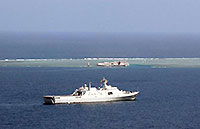Myanmar jets haven't entered China's territory
By Agencies in Yangon, Myanmar and Beijing (China Daily) Updated: 2013-01-07 02:27China's air force issued a statement on Saturday denying Myanmar jets have crossed the border into Chinese territory, as analysts urged the Myanmar government to ensure its border security.
According to the statement, China's air force has strengthened aerial surveillance over the China-Myanmar border area since the conflict in Myanmar began. The closest Myanmar jets are 5 kilometers from the border.
Meanwhile, Foreign Ministry spokeswoman Hua Chunying emphasized that the issue is Myanmar's internal affair. "China hopes that the Myanmar government can properly deal with the issue with the relevant party through peaceful negotiations and maintain tranquility and stability in the China-Myanmar border areas," She said.
"Beijing hopes Nay Pyi Taw can resolve the conflict in a peaceful way." said Zhang Xuegang, a researcher with the China Institute of Contemporary International Relations, "I believe the Chinese government will not get engaged in the armed conflict between the Myanmar military and the Kachin Independence Army, but it is urgent for the government to guarantee the safety and property of Chinese people who live in Southwest China's Yunnan province, which borders Myanmar."
Zhang said as a neighboring country, China has "inevitably" been affected by conflicts in Myanmar. In 2009, the Kokang incident caused a large number of Myanmarese people living along the border to enter China.
Hua, the spokeswoman, also confirmed on Friday that three bombs had landed in China in the evening of Dec 30 during the armed conflict between the Myanmar military and the KIA.
Hua said China has lodged representations to Myanmar, adding China demanded Myanmar immediately take effective measures to prevent similar incidents from happening.
Myanmar President U Thein Sein met on Saturday with General Mutu Say Poe, the newly elected leader of the ethnic Kayin National Union, to seek a guarantee of lasting peace with the group.
U Thein Sein reiterated the government's commitment to bringing peace and called for cooperation to grant equal constitutional rights to all nationalities despite political differences and stressed the need to grasp the chance to build up a society where eternal peace prevails.
Mutu also expressed the KNU's strong desire to build on the cease-fire through negotiations and work toward peace.
With a belief in safeguarding sovereignty and striving for peace and stability, the remaining work won't be difficult but needs time, Thein Sein said.
The KNU, an anti-government ethnic armed group in Myanmar's Kayin state, has fought the government for more than six decades since Myanmar's independence.
Since the president's peace offer was extended in August 2011, 10 armed groups out of 11 have signed preliminary peace agreements with the government at the state or central level.
However, peace talks with the KIA remained deadlocked.
Xinhua—China Daily
Liu Yedan contributed to this story.







